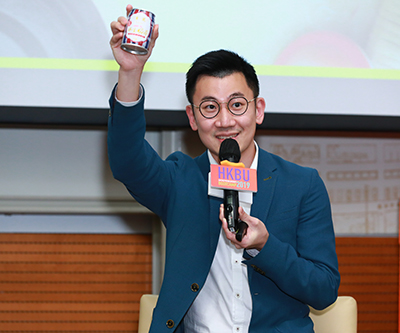Time for tea
For Calvin Tse, training and experience as a CPA were the perfect preparation for a career as an F&B entrepreneur.
Skills for life
These days Calvin Tse Hoi Fat is the founder and CEO of restaurant group Kam Kee Holdings Limited, based around the much loved cha chaan teng brand of the same time. But to get there, he first worked as a CPA – and says that the skills he acquired have been vital to his entrepreneurial journey.
Tse graduated in 2005 from The Chinese University of Hong Kong, where he majored in business administration, focusing on accounting, and minored in information technology. “When I was young, I wanted to start my own business and I thought that if I were going to do so, accounting would be the basic stuff that I need; that’s why I picked accounting in university,” he says.
Like many accounting graduates, he first worked as an auditor, spending about four and a half years between 2005 and 2010 working at KPMG. During that time he rose to the position of assistant manager of the assurance department, where he worked mainly for financial services clients. In contrast to most recent graduates who join Big Four firms and typically describe the workload as daunting, he characterises his time working there as “relatively relaxing compared to some other industries”.
He studied for the QP while working at KPMG, applying as soon as he graduated and completing his qualification in 2006. The course, he says, was the obvious choice for someone who wanted to work as an accountant in Hong Kong – as well as being the only qualification programme for which his employer would provide him with extensive training and study leave.
“I enjoyed studying for the QP. The exams and the subjects covered are comprehensive. It was useful for my work in the audit department, and I could learn about subjects like taxation and corporate finance.”
After leaving KPMG, he launched his first company in 2010, Mexican eatery Mr Taco Truck. He was involved in the company for three years, eventually selling his stake in it to his then business partner.
“I learned a lot from my first try at entrepreneurship,” he says. “Obviously I had not been in the food and beverage (F&B) industry before, and neither my partner, who was an ex-investment banker. We discussed the kinds of industry to go into and considered quite a number. We looked at our own skill sets and decided to do something that both of us were interested in – and we both like eating. My partner had studied at The University of California, Berkeley and where many delicious Mexican food trucks operate.
“I acquired most of my basic skills and knowledge of the F&B industry in that first job. In those three years I took up different roles: cashier, in the kitchen, on the floor, cleaning. But the market for Mexican food in Hong Kong is small.”
Second time lucky
With that in mind, he decided his second business would be mass market – and Kam Kee, a cha chaan teng chain steeped in history, was the ideal candidate. The business was first established in 1967, but the previous owner decided to close it in 2012 due to increasing rental costs and the lack of an obvious family successor; Tse and his partner bought just the brand name, and opened their own first outlet under it in 2013. The company now has more than 30 restaurants under six different brand names, and employs about 1,000 people.
“When I started my second business, I decided to pick up partners who had experience in the F&B industry,” he says. “My own strength is in office work, figures and management. We think it’s a good combination. With Mexican food, we couldn’t expand quickly. With the current business, we can expand very fast, and we don’t need to educate people about the food.”
He adds that his qualifications and experience as a CPA have helped him as an entrepreneur in numerous ways.
“Obviously accountancy training focuses on figures, which is a key tool in business. I find that a lot of entrepreneurs do their businesses well but don’t know what’s happening in their own companies because they don’t know what the figures represent. Also, during my time at KPMG I learned to be a good trainer. In fact I mastered the skills of management, HR, finance, communication and training – all must-have skills as an entrepreneur.”
“In addition to his accounting qualifications, Tse also has two law degrees, a bachelor from the University of London and a master in Chinese Law from Renmin University of China in Beijing.
“I usually tell people that two weapons are necessary if they want to start their own business. They are accountancy and law,” he says. “If you have basic knowledge of them both, you’ll know how to protect yourself, including knowing about when you need to consult a professional. Law teaches you to view the same issue from different angles.”
His academic credentials also extend to the role as an adjunct professor of business administration at Jiangxi University of Finance and Economics in Nanchang, the mainland China. And, as if all that weren’t enough, he also finds time for a range of other community service activities: he is Charter President of the Rotary Club of the Guangdong-Hong Kong-Macau Greater Bay Area, and he has been Chairman of the Hong Kong General Chamber of Young Entrepreneurs since 2018, after joining the group as a founding director three years earlier. “I enjoy serving the community and meeting new people,” he says. “Through my interaction with them, I learn a lot.”
Interview and reporting by Richard Lord






